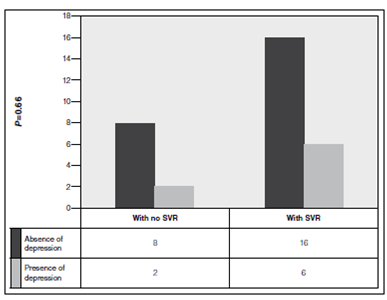ABSTRACT
Background
The effectiveness of antiviral therapy with pegylated interferon and ribavirin for chronic hepatitis C is far from ideal and presents several adverse events. Among such events, there is the depressive episode that can even lead to treatment discontinuity
Objective
Analyze the incidence of depressive episodes in patients with chronic hepatitis C treated with pegylated interferon (IFN-PEG) and ribavirin, as well as the possible factors associated with its occurrence and its impact on patients' sustained virological response.
Methods
People with chronic hepatitis C undergoing antiviral therapy were interviewed at the baseline, at the 4th, 12th, 24th and 48th treatment weeks and 4 weeks after the end of it, using the HADS scale for tracking the depressive episode. Patients with HADS ≥9 were subjected to Beck Depression Inventory (BDI-II) to grade the episode. Clinical, sociodemographic, laboratorial and histological variables were obtained to identify factors related to the onset of depression. The sustained virological response rate (negative HCV-RNA 6 months after end of therapy) was compared among patients with and without depressive symptoms.
Results
The study comprised 32 patients, most men (59%) with mean age of 54±11.13 years old. Genotype non-1 was prevalent (56%) and 81% of the patients were non-cirrhotic. The depressive episode was diagnosed in 25% of the patients and the peak incidence was found in the 12th treatment week. The depressive episode was moderate in 87% of the patients and only one patient abandoned the treatment. None of the analyzed factors was associated with depressive episode onset. A trend was observed in female patients ( P=0.08). The sustained virological response rate was of 75% and 67% in patients with and without depressive episode, respectively (P =0.66).
Conclusion
The incidence of depressive episodes in patients with chronic hepatitis C undergoing antiviral therapy was of 25% and the 12th treatment week was the most critical one. The presence of depressive episode did not affect the sustained virological response rate.
HEADINGS
Depression; Chronic hepatitis C; Interferon-alpha

 Thumbnail
Thumbnail
 Thumbnail
Thumbnail
 Thumbnail
Thumbnail


